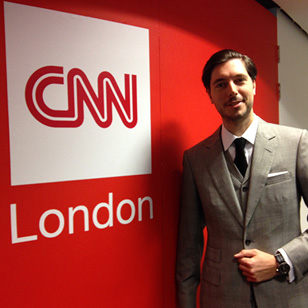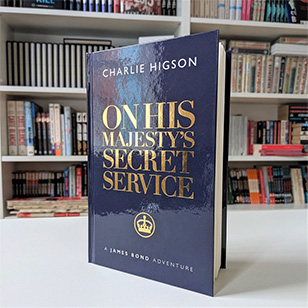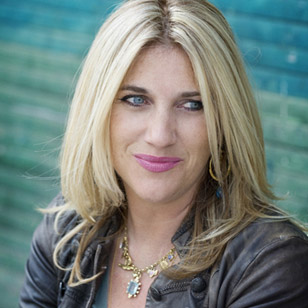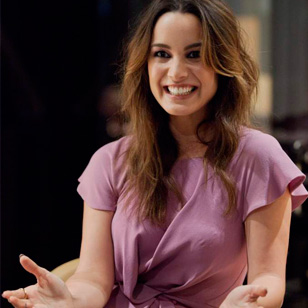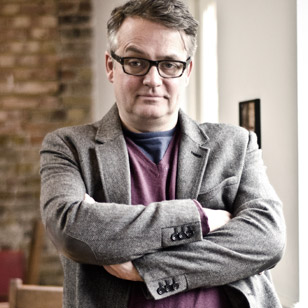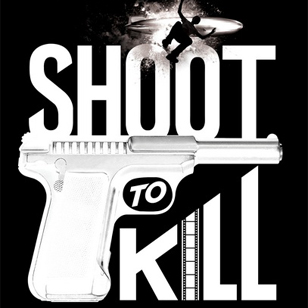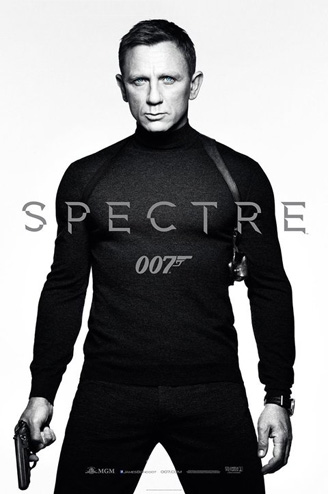Charlie Higson Interview
This interview with Young Bond author Charlie Higson is an excerpt from the book Becoming Bond by Jason Wain.
“The smell and noise and confusion of a hallway full of schoolboys can be quite awful at twenty past seven in the morning”
– Charlie Higson, Silverfin
They say that the opening sentence of a book is the most important one. Publishers can reject any manuscript seeing the light of day based on that alone, and the everyday reader often makes a vital, if subconscious, decision as to whether they want to carry on reading depending on that first sentence. Compare the one above, the opening sentence of SilverFin, with that of Fleming's Casino Royale: “The scent and smoke and sweat of a casino are nauseating at three in the morning”. Poignant, witty and smart, Charlie Higson made it clear from that first sentence that he meant business when he took on the role of author of the Young Bond series.
But hardcore Bond fans weren't happy when they first got wind of what Higson was up to. “When it was announced the James Bond fan sites were absolutely furious; they didn't want books about young James Bond,” Charlie says. And perhaps rightly so. After all, Charlie Higson was a television comedian who had never written for children before. Harry Potter was booming and many of them suspected something on parallel lines. But perhaps the most prevalent worry on the aggrieved Bond-fan mind was James Bond Junior – an animated serialisation released in the 1990s in America, which, according to Higson, is widely regarded as “James Bond's darkest hour”.
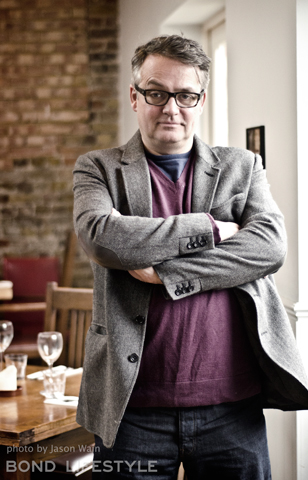 “They were saying things like 'this is an absolute disgrace! I don't want to know what James Bond was like as a child; for me James Bond is the ultimate man, and that's his appeal. So I don't want to see him at school, trying to do his homework, and drinking milk.'”
“They were saying things like 'this is an absolute disgrace! I don't want to know what James Bond was like as a child; for me James Bond is the ultimate man, and that's his appeal. So I don't want to see him at school, trying to do his homework, and drinking milk.'”
Indeed, Bond's figure as the 'ultimate man' is one of the many factors that has made the franchise a success. And this is one of the reasons I have come to meet Charlie today; to try and learn from a key inside figure what makes James Bond so enduringly successful against many odds, as well as learning the behind-the-scenes story on what it's like to actually write a James Bond novel.
It's a typically grey Friday afternoon in January when I go to meet Mr. Higson in a pub-slash-deli near his home in North London. There are plenty of mothers with toddlers enjoying coffee and gossip in the buzzing deli. I sit waiting by a window, watching the soft flicks of drizzle animate the almost monochrome street outside. Thankfully, the Tufnell Park Tavern has a warm environment and the coffee is good. When Charlie arrives just after 12 o'clock, dressed smart-casual in a purple jumper and grey jacket, we move to the pub (less mothers there) and order a cappuccino. Meanwhile, I prepare to give him possibly his one millionth grilling on the seemingly inexhaustible subject of James Bond. Discovering where it all began for him seems an appropriate place to start.
Higson's first encounter with Bond was when Thunderball first came out, and he went to see it at the cinema at the tender age of six years old. It certainly had an impact on him. “I can remember quite a lot about that experience and how exciting it was. I just thought that this was the most exciting thing. James Bond was prepared to do quite nasty, brutal things; he was not that traditional 'decent chap' type of British hero. I remember being quite shocked by this as a kid,” He laughs.
Bond was already a major phenomenon at this time, almost 50 years ago. “Still today Thunderball is, in terms of the number of people that actually went to see it, the biggest James Bond film ever. I think something like one in three people in America saw it in the cinema,” he says with a tone of mixed awe and incredulity. “It led to a huge explosion of spy films and TV series' around the world. I think in the next couple of years after Thunderball something like 700 spy films came out.”
The Bond-mania has in no way subsided over the years either; with Casino Royale being the most successful box office hit and Quantum of Solace not doing badly either. But what is the reason for this success? 50 years, 22 films, and with the 23rd well on its way to our screens, there is simply nothing like it. Surely there must be more to it than cars, girls, explosions and cheesy one-liners? “It’s a combination of so many factors. The fact of the matter is that the books are very good, well written thrillers and they are still readable today. So you’ve got a good product to start with and when it was first written it was quite revolutionary. Ian Fleming very much wanted to write a new kind of hero; he’d been through the Second World War where he’d been working in intelligence. He said, look, the things that have gone on in the Second World War, we can’t pretend that the world is a nice place and everybody’s decent. We need a new kind of hero and a new kind of book, and we need to be a bit more realistic about the things that people do to each other.
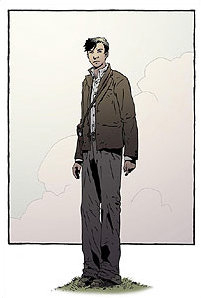 “That being said there were a lot of thriller writers around at that time who were very popular, who now nobody really reads because of the films. Once Eon took over and regularly had a film out every two years, it was the films that really pushed Bond into the stratosphere in the sixties, and then by continually reinventing Bond, they’ve managed, very cleverly, to keep it alive.”
“That being said there were a lot of thriller writers around at that time who were very popular, who now nobody really reads because of the films. Once Eon took over and regularly had a film out every two years, it was the films that really pushed Bond into the stratosphere in the sixties, and then by continually reinventing Bond, they’ve managed, very cleverly, to keep it alive.”
Charlie then goes on to explain how each decade of Bond has represented something different, usually related to cultural changes or movements in society. He explains how in the sixties Sean Connery was cool, cynical and a little bit nasty, then in the seventies Bond became quite camp with Roger Moore. It was the middle of a depression and things were falling apart. “I think the idea was that they [Eon] said 'we can’t really take James Bond that seriously, so we’ll have a kind of disco Bond' with his safari suit, and Roger Moore who never really was much of a threat to either the women or the enemy.”
And then in the eighties Charlie describes how Timothy Dalton portrayed a “very PC Bond. He’s only allowed one girlfriend, he can’t smoke, he’s not allowed to drink too much, and he puts his seat belt on.” Things changed again in the nineties with the explosion of the designer era. “Suddenly it was alright to like expensive things, and there were all those men's magazines like GQ, and FHM, which got huge on the back of selling suits and ties and cufflinks and cameras and nice shirts and pictures of yachts. It became an aspirational thing to actually be James Bond.” Finally we hit the new decade, the current era of Bond, where “nobody really knows what’s going on anymore and you get the slightly confused Daniel Craig. There is a lot of retro stuff, talking back to the old films et cetera.”
There are other reasons, beyond its ability to move with the times, for Bond's enduring success. Charlie explains how Bond is a blueprint of how to be a man about the town; “There’s a lot in the books, and in the films, about how to order food in nice restaurants, how to order wine, how to treat ladies,” – he laughs – “it's probably not great to try the James Bond approach actually, unless you’re Pierce Brosnan, or Daniel Craig!”
What I want to know is whether Higson finds it all a bit over the top. For example, a few days before the interview the first official image from Skyfall was released. It displayed a picture of Daniel Craig from behind, sitting alone at the side of a moodily lit swimming pool at night. The internet was abuzz. Even the Guardian published a small (and slightly sarcastic) article, speculating on the meaning of the photo. Surely, this is not worthy of such hype?
“It's particularly in this country that there is that obsession with James Bond, because he's seen as being such an integral part of our culture, even though the films have been made essentially by Americans. Everyone becomes so childishly excited about it,” he agrees. “When every new film comes out I get rung by quite a lot of the serious news people like Radio 4, and television channels, and they all want to do something about James Bond. At the drop of a hat they'll be dressing up in Tuxedos and posing with guns,” he chuckles wryly. But he won't go as far at to agree with my suggestion that it might all be overrated, I note. Is that because he is too much of a fan himself? Or is it because it isn't overrated; is it simply a phenomena that is as good and big as, and therefore deserving of, its hype?
Either way, Charlie Higson has become an intrinsic part of the James Bond phenomenon through his writing of the Young Bond series. The fans' apprehension at the announcement of these books was understandable. After all, how could this television comedian in his early forties produce something truly worthy of the Fleming canon? Indeed, how even did he come to write the books?
As it turns out, before Charlie had launched his television career, he had written four adult thrillers in the early to mid nineties. His editor, a woman called Kate Jones, had left his publisher due to an illness and then had returned to the publishing industry working for the Fleming estate. Jones was keen to plan a project that would culminate in Ian Fleming's centenary year and remind people that Bond had started with Ian Fleming. At the same time, the Harry Potter series was proving to be a large success and was reminding the world that children could still get into reading. In addition to this, Anthony Horowitz had begun publishing his Alex Rider series; the adventures of a teenage spy. And thus the idea of doing a young James Bond series began to form. “So they spoke to a number of writers, including Anthony Horowitz actually, and Kate suggested me, because she knew I was a Bond fan, she knew I had children, and she felt that my writing style would work well for kids. I was at a point in my life where I had three boys and I wanted to write something for them, so it was a perfect job really.”
I’ve taken on the best known hero in the world; the biggest phenomenon around. I thought, 'well, this could go very, very badly wrong'
I wondered whether Charlie felt under a lot of pressure – to fly the flag for such a global icon in a manner that could either be extremely successful or simply disastrous. “No. When I started I just thought 'well this is such fun really, to be allowed to write a James Bond book'; to actually write 'the name's Bond, James Bond'. I just loved writing the book.” Higson managed, in fact, to include the famous quip on the second page of the first chapter of SilverFin. “It was only when we got close to making the announcement that I thought 'oh ****, this is James Bond!'” He laughs, “I’ve taken on the best known hero in the world; the biggest phenomenon around. I thought, 'well, this could go very, very badly wrong'.
“But I was confident because I felt the book worked and I felt it had enough of Fleming in it and enough traditional Bond.” According to Charlie there are in fact hundreds of direct references and subtle nods to Fleming's Bond intricately woven throughout the five book series. “You'd have to be an absolute Bond-nerd to spot them all,” he says.
Charlie's confidence and belief in his ideas, despite what fans had said, paid off, and the books turned out to be a massive success. SilverFin alone sold over a million copies and has been translated into 24 different languages. “You can get too obsessed about what people think,” says Charlie, and then adds in true Bond-style, “but you’ve gotta stick to your guns.”
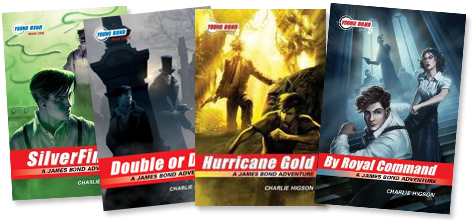
One of the fascinating aspects of reading Fleming's biography is seeing how many different factors from Fleming's life actually form the character and stories of James Bond. I mention this to Charlie and ask whether any of his childhood adventures and fantasies have been spun into the script.
“It is interesting that it [Bond] had a basis in his [Fleming's] experiences in the Second World War, but I think Fleming slightly exaggerated himself as James Bond; he definitely liked to play up to the playboy image. In the end he was like any other writer, he sat in a little room and made it all up. But yes, he liked it to have a basis in fact. But me? I'm a writer like Fleming, I spent my life sitting in rooms making things up. I didn't really have any James Bond style adventures when I was a kid,” he finishes, possibly noticing my crestfallen face.
The Young Bond series finished with By Royal Command in September 2008. Charlie clearly enjoyed writing these books so I prod him about the possibility of any future Young Bond – or indeed, adult Bond – stories. “It was a lot of fun writing the books, and it established me as a children's author. The reason I stopped doing it was because I didn't invent James Bond. I wish I had! Dammit!” He laughs, thumping the table. “I think it was John Gardner who said, 'it's great fun but in the end you are polishing somebody else's gold'. So I wanted to write books that were entirely my own creation. But I would hate to think that my relationship with James Bond was over. I've got an idea for a little trilogy of his adventures at the Scottish school Fettes, where Bond goes when he leaves Eton. So we shall see.” Charlie is also very much an actor so I quiz him as to whether there is any chance we'll see him in Skyfall. “They've never approached me,” a peeved sounding Charlie admits. “It would be great. To be in a James bond film must be everyone's dream.
Time is ticking on, and I realise I only have time for another one or two questions. “Have you ever tried to be James Bond?” I slip in. “Ah, I couldn't...,” he smiles “But we all like doing it don't we? We all like dressing up in a suit, being in a nice car and drinking cocktails and champagne. There is that enduring appeal; it still is kind of the pinnacle of manliness. Despite the fact that James Bond is actually pretty silly. The idea of this secret agent that keeps saving the world but the enemy don't ever seem to know who he is; who swans around drinking his special martini, and chatting up girls with really corny, cheesy lines; and shooting people for a living. It's very silly and it's very childish, but it appeals to the boy in all of us really.”
This interview with Young Bond author Charlie Higson is an excerpt from the book Becoming Bond by Jason Wain. Copyright 2012 Jason Wain - http://jasonwain.co.uk/




